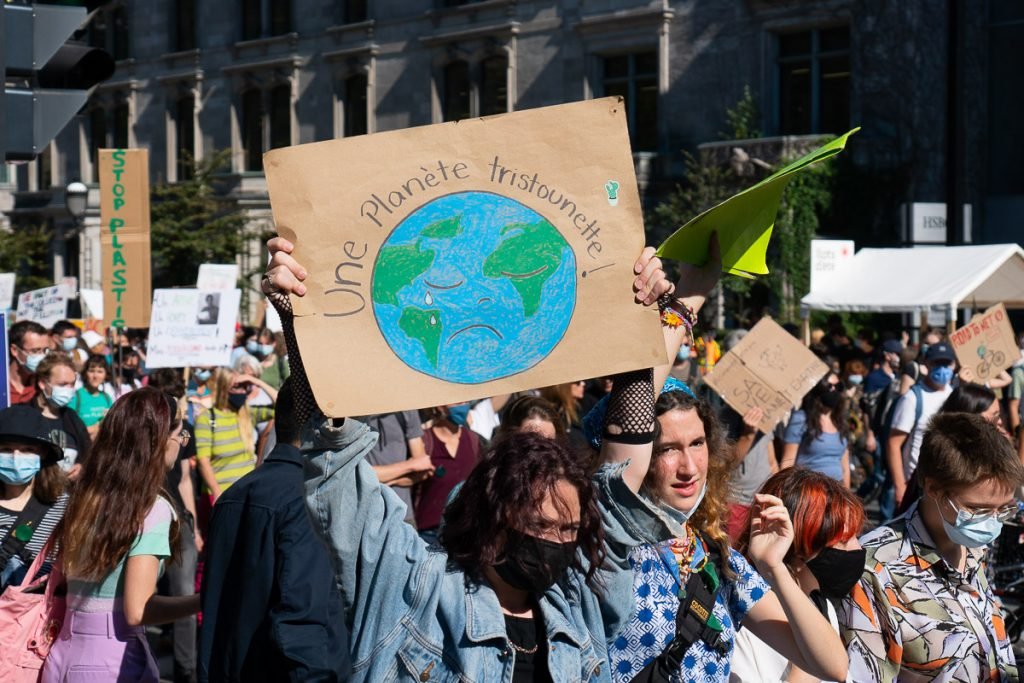Thousands take to the streets to demand action on climate change

Thousands gathered at the foot of Mount Royal last Friday, Sept. 24 to demand that politicians around the world take decisive action to address the ongoing climate crisis. It was one of the many climate demonstrations taking place both in Canada and around the globe that day.
Organized by Pour le Futur Montreal and The Racial Justice Collective, the demonstration attracted thousands to the George-Étienne Cartier Monument before the group walked down Parc Ave. and through downtown Montreal holding up placards and chanting slogans.
Although mainly concentrated on the climate crisis, the demonstration tackled several different issues. “The climate crisis does not exist in isolation,” read a statement put out by the organizers. “It is tied to and is amplified by other crises such as racism, sexism, ableism and class inequality,” they continued.
Most attending the march wore masks and did their best to social distance in the crowd of thousands. Protestors of all ages waved signs with slogans such as “#uprootthesystem” and “we only have one planet.”
“Seeing as we are responsible for these problems I believe were also able to make the necessary changes,”
Greta Thunberg
The annual demonstration originated with Swedish activist Greta Thunberg’s first climate strike in 2018 when she walked out of her classes in protest of the climate crisis. Many soon followed in her footsteps, creating a global environmental movement in the process.
“They created the hashtag #FridaysForFuture, and encouraged other young people all over the world to join them,” said Pour le Futur Montreal’s spokesperson in an interview with CTV News.
“Their call for action sparked an international awakening, with students and activists uniting around the globe to protest outside their local parliaments and city halls,” continued the organization. “Along with other groups across the world, Fridays for Future is part of a hopeful new wave of change, inspiring millions of people to take action on the climate crisis.”

Wide-ranging demands
Although it was clear that their demands were varied in scope and breadth, the organization behind the protest released several key policy demands they wanted to see governments put in place.
“An immediate end to all fossil fuel production and exportation,” was one key demand put forward by the group, in addition to financial compensation for workers in polluting industries to make up for the potential loss of employment.
“Enhanced and expanded protection of natural environments, and restoration of damaged ecosystems,” was another of their major demands, adding that this could be achieved by diminishing people’s general material consumption.
Their policy recommendations were also economic, with activists demanding a push towards the retrofitting of houses and apartments to be more eco-friendly and the reduction of the workweek in order to “reduce the consumption of material goods and allow more time to dedicate to family, community, sports, preparing healthy meals, tending to vegetable gardens, etc.”
Largely peaceful march
Given a large number of people in attendance at the protest, the accompanying police presence was also heavy, including several riot control units and a helicopter.
There were three arrests made over the course of the protest. These included different situations involving alleged mischief, making threats and assault on a police officer. One person was also seen tearing down Ensemble Montréal election posters on Parc Ave. and Sherbrooke.
“So three arrests were made by the Montreal Police Department side, no one was injured, and at this moment the protest is now over,” said SPVM spokesperson Jean-Pierre Brabant to CTV News.
Regularization of immigrants
Although not directly related to the topic of the march, organizers were also calling for the regularization of status for all immigrants and refugees as well as the defunding of the police.
“According to the United Nations Refugee Agency, 24,9 million people were forced to migrate due to climate change in 2019,” read part of their statement, adding that accepting refugees is part of guaranteeing climate justice.
The groups also called for funds that are currently going towards policing to be reallocated to address the factors that lead to crime.
“Within the context of the climate crisis, where heat waves, floods, pandemics, etc. are increasingly frequent, it is essential that everyone has access to services that allow them to lead a better life, as opposed to receiving punishment that does nothing to address the root problem,” concluded the statement.
Natural processes
Edouard Hipollyte is a recently graduated environmental geographer and was one of the many people who took part in the march last Friday. “It’s a problem that everyone has a stake in,” he said.
“My path in environmental geography made me understand that climate change was a lot more complex than I thought it was before,” he explained, clarifying that the scientific processes contributing to climate change are completely natural but are severely accelerated by human activity.
Although he appreciated the intersectional nature of the varying messages at the rally, he also felt it somewhat lacked direction. “It’s important to have focus,” said Hippolyte, explaining that activists needed to know who they were talking to so they can tailor a concise and convincing message
“Seeing as we are responsible for these problems I believe we’re also able to make the necessary changes,” he added, underlining that he felt optimistic at solving the challenges ahead. “Going to these gatherings helps you realize your part of a movement and helps diminish your anxiety towards it.”










